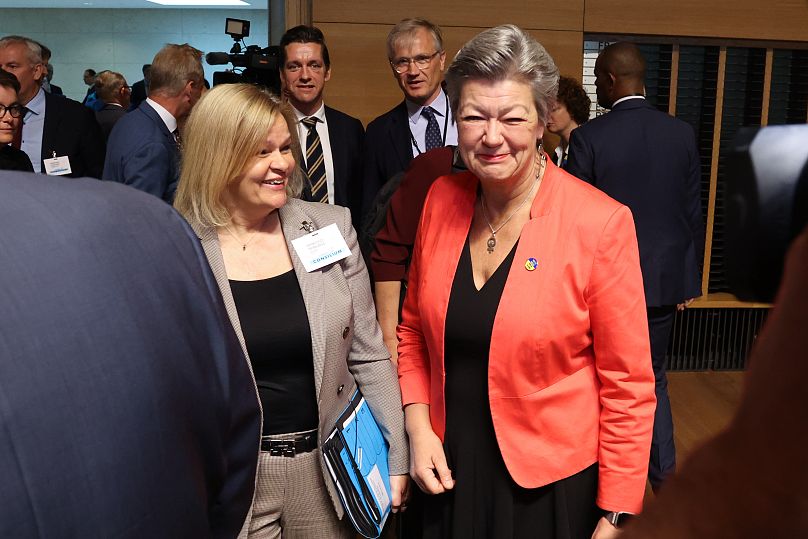EU home affairs ministers achieved "major progress" in the negotiations around a long-stalled pact on migration and asylum.
The European Union appears to be closer than ever to reforming its migration system as home affairs ministers achieved "major progress" in the negotiations around a long-stalled pact on migration and asylum.
 ADVERTISEMENT
ADVERTISEMENT
 ADVERTISEMENT
ADVERTISEMENT
"Support by a large majority for two regulations to strengthen the protection of EU borders and for a solidarity mechanism to help Member States under strong pressure," said Ylva Johansson, the European home affairs commissioner.
It was not immediately clear which countries were outside the "large majority" support.
Ministers met in Luxembourg on Friday to give the final push to the migration pact, one of the top priorities of the French presidency of the EU Council.
Gérald Darmanin, France's interior minister, said a meeting will be organised "in the coming days" to finalise the technical details of the "historic agreement", a characterisation also used by Johansson.
"We can conclude that this has been an extremely successful Council meeting," she said.
The new pact on migration and asylum is a series of legislative proposals, roadmaps and recommendations that was put forward by the European Commission President Ursula von der Leyen in September 2020.
The pact intends to turn the page on the tense years that followed the 2015 migration crisis, when the reception systems were overwhelmed by a sudden arrival of asylum-seekers, mostly from Syria, and member states quarrelled bitterly with each other to relocate them.
The crisis fostered great political tension between frontline states in the South, who had the responsibility of processing the asylum claims; transit states in Central Europe, who criticised the lack of proper border managements; and destination states in the North, who had the final task of hosting and integrating thousands of refugees.
But over the past months, the war in Ukraine has created more of a spirit of unity among EU countries, who quickly opened their borders to welcome the millions of refugees fleeing the brutal invasion launched by the Kremlin.
Among the main proposals of the new pact is a mechanism of "voluntary and temporary" solidarity that would get rid of mandatory relocation quotas, seen by many capitals as politically divisive.
The mechanism would be triggered when a country's migration system is considered to be "under pressure" by a migration influx. Once activated, other EU countries would offer their assistance by:
- Hosting a share of the migrants in their own territory.
- Sponsoring the return of those whose applications to stay inside the EU have been rejected.
- Provide financial contributions and operational support to the country under pressure.
The system was designed to placate the concerns of Southern countries, who often complain about being left to fend for themselves without any extra means or help, and those countries who are adamantly opposed to hosting refugees and could now be exempted of doing so if they agree to send money and assistance.
Darmanin said the mechanism offers a "great deal of flexibility" and is based "on choice". He noted that "nearly all" member states had expressed support for the solidarity principle, up from only 10 countries at the beginning of his mandate. He did not name those who remain opposed to the deal.
"Member states think relocation should not be the main source of solidarity," the French minister said.
The delicate compromise, however, has been harshly criticised by civil society organisations, who think it fails to solve the issue of overcrowded camps and pushbacks at the external borders.
"Apart from being temporary and voluntary, the proposal allows EU countries to cherry-pick their asylum seekers," said Stephanie Pope, a migration expert at Oxfam EU.
"It also allows them to turn away asylum-seekers and, instead, pay for a Fortress Europe by footing the bill for border surveillance and detention centres."
The solidarity mechanism is part of a draft regulation and must be approved by the EU Council and the European Parliament before entering into force.
Friday's breakthrough also moves forward another proposal to strengthen the control of the external borders of the passport-free Schengen Area and coordinate the adoption of temporary travel restrictions, building upon the lessons learned during the COVID-19 pandemic.
The remaining parts of the migration and asylum pact will continue to undergo negotiations in the EU Council.
In order to achieve a compromise, the French presidency has promoted a step-by-step approach, prioritising certain elements of the pact, like the novel solidarity mechanism, over others.
The Czech Republic will take over the EU Council on July 1st.
Meanwhile, the EU Parliament wants to go faster and negotiate "all files no later than December 2022," according to Tomas Tobé, the Swedish MEP who acts as the parliament's main negotiator for the pact.
"Laws, not ad-hoc solutions, will guarantee sustainable and reliable asylum and migration policies that balance solidarity and the fair sharing of responsibility," the lawmaker said on Friday.
This article has been updated to include new developments and reactions.











